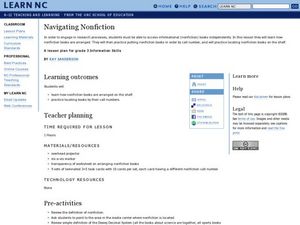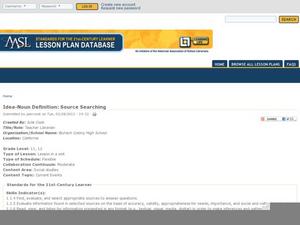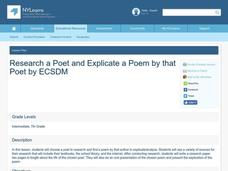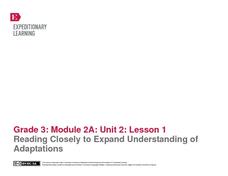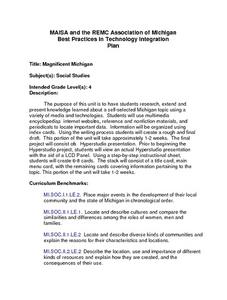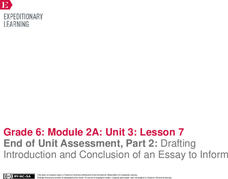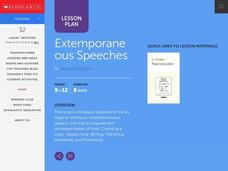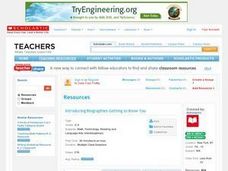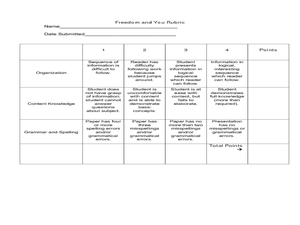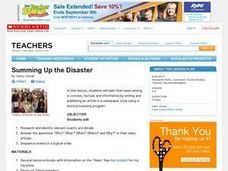Curated OER
Fiction vs. Nonfiction
Students explore fiction and nonfiction writing. They identify the elements of fiction in a short story and identify the criteria necessary in a nonfiction piece. Students distinguish the author's purpose in an expository text,...
Curated OER
Lesson Six: Nonfiction Text Elements (Part One)
Students examine nonfiction text elements in preparation for writing a nonfiction book about Lewis and Clark. In this social studies/language arts lesson, students discuss the term research and complete a cluster map. Additionally,...
Curated OER
Navigating Nonfiction
Third graders explore the arrangement of nonfiction. In this library skills instructional activity, 3rd graders examine Dewey Decimal classification as they collaborate to locate nonfiction materials in the library/media center.
Curated OER
The Purpose and Power of Persuasion
Examine the power of persuasion and have learners consider how it influences events in their own lives. After reading and analyzing informational texts to understand the author's purpose, class members take a written test and craft a...
Curated OER
Insects
It's a fact: kids love bugs! With this lesson, young learners explore reading informational texts and conducting research while learning about their favorite insects. Spark learners' interest by reading a book about one kind of bug and...
Curated OER
Using Details From The Text
Begin this expository writing activity by reading a non-fiction book of your choice and modeling expository writing. The plan suggests The Trip of a Drip by Vicki Cobb but notes that other texts will work. Learners then choose a...
Curated OER
George Winter Lesson Plan 3
Bring language arts and U.S. history together in this lesson, which prompts middle and high schoolers to gather biographical information about Abraham Lincoln. They compare and contrast information written about his childhood and discuss...
Curated OER
Author's Purpose: Research Process/Narrative Writing Techniques
Determine the author's purpose in writing a memoir. Eighth graders work in groups to elicit author's purpose in memoirs, taking care to note how subtle the message can be hidden throughout the work. This lesson is a good way to...
Curated OER
Can You Get the Signal?
What is a signal word? Recognizing these words is an important step in both reading and writing formal text. Review a list of signal words (provided and organized into specific categories), and then have your class play a game to...
Scholastic
Prescription Pain Medication: What You Need to Know
The national epidemic of opioid addiction is making its way into high school populations. Educate the students in your class about the ways prescription opioids can both block pain and deliver large amounts of dopamine that make it very...
Curated OER
Abigail as Letter Writer
The fourth instructional activity in the series of 16 asks researchers to analyze an exchange of letters between John and Abigail Adams for what they each valued in letter writing.
Curated OER
Conducting Research
Third graders conduct research. For this conducting research lesson, 3rd graders discuss the importance of nonfiction text in providing factual information. Students write questions about an assigned topic and research using...
Curated OER
Idea-Noun Definition: Source Searching
A great idea for showing language arts pupils the universality of themes, even in the real world! Have class members choose an idea-noun (peace, justice, war, love, etc.) at the beginning of the year or semester. They complete weekly...
Curated OER
Research a Poet and Explicate a Poem by that Poet
Seventh graders choose a poet to research and find a poem by that author to explicate/analyze using a variety of sources for their research that will include their textbooks, the school library, and the internet. After conducting...
Curated OER
Analyzing Short Biographies to Discover Characteristics of Biographical Writing
Students read short biographies on Abraham Lincoln from various artists. Using the texts, they identify the subject of the biography and discuss whether or not illustrations contribute to a biography. They research specific information...
EngageNY
Reading Closely to Expand Understanding of Adaptations
Third graders work to determine the main idea, recall key details, and answer questions using an informational text on the topic of animal adaptations. Using the non-fiction text "Staying Alive: Animal Adaptations" (provided) the teacher...
EngageNY
Close Reading of Bullfrog at Magnolia Circle: Main Ideas about the Bullfrog
As your class reaches the end of the book Bullfrog at Magnolia Circle, the seventh lesson in this literary unit helps third graders transition from reading narrative to expository writing. Scholars develop their note-taking skills...
Curated OER
Magnificent Michigan
Fourth graders complete a research project about the state of Michigan. They conduct Internet research, organize the information on index cards, and create a HyperStudio presentation.
EngageNY
End of Unit Assessment, Part 2: Drafting Introduction and Conclusion of an Essay to Inform
A powerful introduction and conclusion can really pack a punch. Using the resource, scholars first read and discuss a model essay. Then, as part of the end of unit assessment, they draft the introductory and concluding paragraphs of...
Curated OER
A Pill with a View
Learners brainstorm a list of potential uses for micro-video technologies. After reading an article, they analyze the development of a new pill-sized camera. In groups, they create a children's book that shows them the various systems of...
Curated OER
Extemporaneous Speeches
High schoolers perform the six steps of writing an extemporaneous speech including, choosing a topic, researching, writing, practicing delivering and processing.
Curated OER
Introducing Biographies-Getting to Know You
Learners study biographies as a nonfiction genre while examining a variety of examples. Next, they access and complete an online tutorial about biographies. They choose one person that interests them to conduct further research using a...
Curated OER
Freedom and You
Students research the American Revolution. In this Revolutionary War activity, students research facts about the American Revolution, write an expository essay, and peer edit for good content. The paper is suggested to be written after...
Curated OER
Summing the Disaster
Students assume the role of a newspaper editor during the time of the Titanic disaster. They must search out the accurate answers to the questions: What? When? Where? Who? and Why? students then write their own newspaper article...


